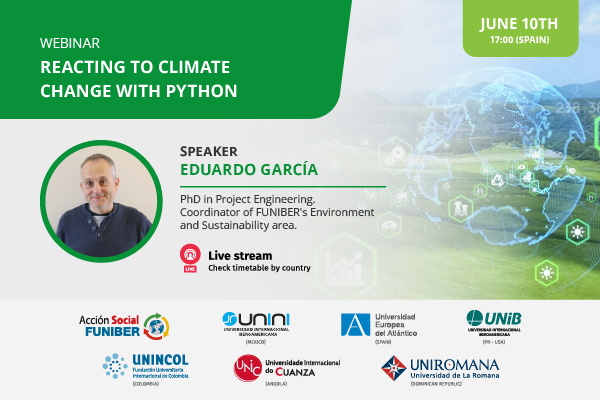
The Universidad Internacional Iberoamericana de Puerto Rico (International Iberoamerican University, UNIB) will organize, next June 10 at 5:00 pm (Spain), the webinar in Spanish language «Reacting to climate change with Python» that will be given by Eduardo Garcia.
The event is held in collaboration with the Iberoamerican University Foundation (FUNIBER), the Universidad Europea del Atlántico (European University of the Atlantic, UNEATLANTICO),the Universidad Internacional Iberoamericana de México (International Iberoamerican University of Mexico, UNINI Mexico), the Fundación Universitaria Internacional de Colombia (International University Foundation of Colombia, UNINCOL), the Universidade Internacional do Cuanza (International University of Cuanza, UNIC), and the Universidad de La Romana (University of La Romana, UNIROMANA).
This webinar aims to show the utilities of Object Oriented Programming (OOP) in Python, to analyze trends and indicators of climate change in a specific region of the world. To this end, first, a brief review of the global warming phenomenon and the importance of albedo in the radiative balance will be given. Then, a brief introduction to this programming paradigm will be given and a simple example will be developed in Google Colab to learn how it works. Finally, an exploratory data analysis and a graphical representation and interpretation of statistical indicators will be carried out, based on a sample of anomalous regional temperatures from the Kaggle repository.
Eduardo García holds a PhD in Project Engineering: Environment, Safety, Quality and Communication. In his role as a researcher he has experience in environmental and Corporate Social Responsibility (CSR) issues, especially in the integration of environmental, quality and occupational risk prevention management systems in the company.
The conference is free and open to all those interested in the subject, and will be broadcast live in each country where FUNIBER has a presence.
Broadcast schedules are available at this link.
To participate, registration is required:
Registration to the webinar «Reacting to climate change with Python».
Registration closes 24 hours prior to the webinar.